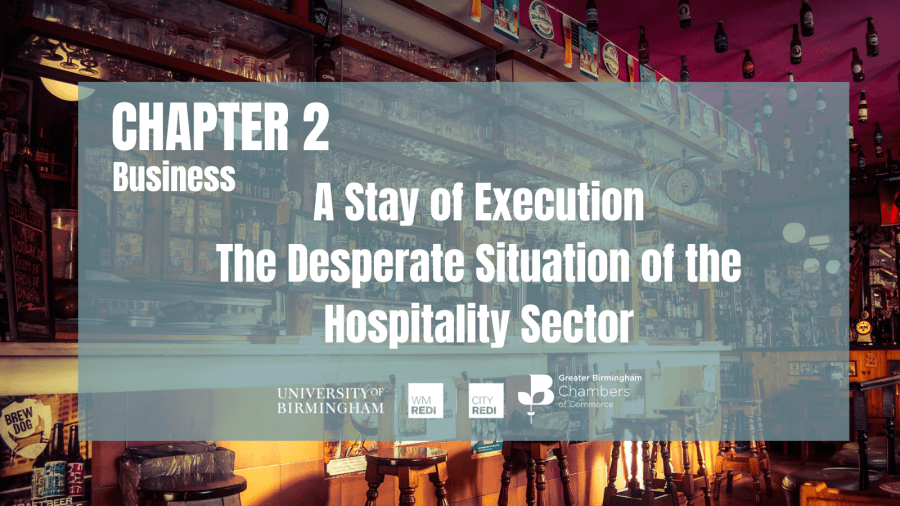1 in 18 licenced premises have been lost between June 2022 and June 2023. Anne-Marie Simpson, Owner of Simpsons Gin Bar, discusses her experiences as a business owner in tough economic times. This article was written for the Birmingham Economic Review 2023. The review is produced by City-REDI / WMREDI, the University of Birmingham and the Greater Birmingham Chambers of Commerce. It is an in-depth exploration of the economy of England’s second city and a high-quality resource for informing research, policy and investment decisions.
The position for the hospitality sector in 2023, is, without exaggeration, desperate. It is a well-cited fact, that 1 in 18 licenced premises have been lost between June 2022 and June 2023. Many businesses narrowly survived the trauma of the Covid pandemic with Government support.
Support
However, if we look at how the support actually manifests, assistance went directly to staff in the form of the furlough scheme (which also had a cost for the employer/business), in grants, which in our case had to be fully used to cover rent and therefore insulated shocks to landlords, and in loans to business, which created a debt legacy, we can see that survival may have been a stay of execution rather than long-lasting support to protect the hospitality industry.
These loans are now adding further pressure to the perfect storm of negative economics that we find our industry in. Labour shortages derived from the Brexit resource drain, consequent labour cost inflation from a reduced resource pool, direct energy price inflation, increased food prices and stock costs, together with the highest taxation climate seen, all serve to pressure the hospitality industry into potential oblivion.

In a healthier economy perhaps, costs could pass through to customers happy to pay for valued services and necessary leisure time, the point is of course – it isn’t just a pressure on our industry, it’s a pressure on our customers and therefore our income base.
Hospitality
In hospitality, we are feeling extreme pressure from both supply and demand side economics. In a climate of unprecedented levels of household energy bills and consequent soaring domestic food costs, tough choices are having to be made and the first thing to go from a pressurised household budget must be discretionary spending – on leisure and hospitality. This is real and happening now. The staggering series of bank rate increases mean further pressure on household costs compounding an already impossible situation for many.
In our own business, we have had to make some tough choices – we now open fewer hours than pre-pandemic, every staff wage has to generate income, weekday footfall has fallen to a level not seen previously and has meant that it can’t cover costs, so we focus driving income on weekend trade. We have taken a deliberate decision to de-register for VAT and limit business turnover – it has been only marginally above the VAT ceiling for two years so in order to reduce our cost base burden this was a necessity. Our turnover is now half what it was for our first two years of trading. Only around 20% of our costs are VAT recoverable but we were paying 20% of 100% of turnover in VAT, which if left unaddressed, would have tipped the business over sooner.

Negatives
These ultimately are negatives for our whole economy. It just doesn’t make sense from a growth perspective. This isn’t healthy for business, the economy, or our High Streets. Hospitality is the lifeblood of Towns and Cities and brings colour, activity and confidence to investment, regeneration and local economic stability. Already the reduced retail presence on the High Street has impacted this – without a healthy leisure offer to provide alternative uses, places will die and degenerate. We are already seeing this in many towns and cities. We have long since given up any ability to take a salary from the business and must do more for nil return, just to maintain survival. This isn’t infinite of course and tough choices on lease renewal or business closure will surely follow.
Our business
We are a small independent hospitality business; I fully accept that some of the larger international businesses may be better equipped for survival in the current climate but is this an industry structure that is good for UK PLC?
Traditionally, the hospitality industry has been structured with many small and medium-sized businesses forming the sectoral composition. We bring innovation, cultural diversity and interest to our places, without some deliberate attention to either support or creation of positive economic conditions for survival, we are in danger of a mono-culture of identity to every High Street at best and at worst, decline and all the community challenges and ultimate cost of reversal associated.
This blog was written by Anne-Marie Simpson, Owner of Simpsons Gin Bar.
The views expressed in this analysis post are those of the authors and not necessarily those of City-REDI / WMREDI or the University of Birmingham.

